-
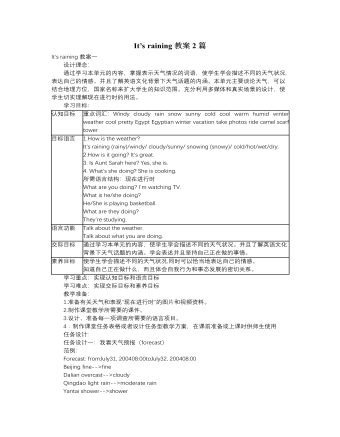
人教版新目标初中英语七年级下册It’s raining教案2篇
1 Each group choose one place to describe and what you are doing in it Choose one place, and describe what they are doing 2 Move around the room and give suggestions Talk about it and write it down 3 Ask one to show their works and act it Choose one of each group to make a report 4 Evaluate the best group and the best reporter Choose the best one Homework Ask your friends their ideal place and write about it教学反思:新课程标准中强调学生在课堂中的主体地位,在综合课中他们的主体地位就更加突出。在各个活动中给不同程度的学生不同层次的任务,让各层面的学生都有表现发挥的机会,从而产生对英语的兴趣。使用照片图片多媒体来辅助教学,效果更好。同时让了解其他国家风景,风俗的同学介绍ideal place,增加学生的背景知知识,实现跨学科交流的目的。教案点评:采用任务型教学模式,在各个活动中给不同程度的学生不同层次的任务,让各层面的学生都有表现发挥的机会,从而产生对英语的兴趣。使用照片图片多媒体来辅助教学,效果更好。让了解其他国家风景,风俗的同学介绍ideal place,增加学生的背景知识,实现跨学科交流的目的。
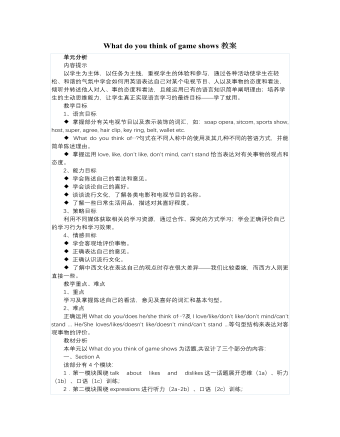
人教版新目标初中英语七年级下册What do you think of game shows教案
五、教学Section B-2c1. Pair work: What do you think of the belt/sunglasses/…? What does your father/mother/… think of your scarf/belt…?2. Group work(1). Teacher shows some different kinds of school uniforms (制服)and asks : “ What do you think of your school uniforms? If you have a chance to choose your school uniforms, what kind would you like to choose?”(2). Discuss in groups.(3).Get some Ss to report in class.说明:这一步旨在让学生运用已有的语言知识谈论对事物的看法和意见,并简单阐明理由,培养学生的主动思维能力和运用英语的能力。六、教学拓展调查电视节目的收视率任务:调查你周围的人对现在各种电视节目的反响。活动过程:1.教师布置任务,让学生调查周围的人(包括他的亲戚朋友和邻居)喜欢收看哪方面的电视节目。2.学生进行调查活动,运用本单元所学的句型What do you think of….? (Why?)What's your favorite game shows?What do you think of talk show?I doesn’t mind it.I like it.I love it.I can’t stand it.3.记录下排在前10位的TV Program,填写调查表,比较其收视率。
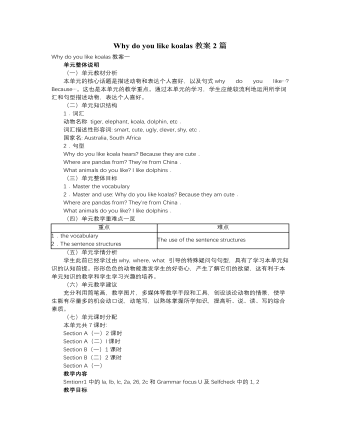
人教版新目标初中英语七年级下册Why do you like koalas教案2篇
单元整体说明(一)单元教材分析本单元的核心话题是描述动物和表达个人喜好,以及句式why do you like…? Because…。这也是本单元的教学重点。通过本单元的学习,学生应能较流利地运用所学词汇和句型描述动物,表达个人喜好。(二)单元知识结构1.词汇动物名称 tiger, elephant, koala, dolphin, etc.词汇描述性形容词: smart, cute, ugly, clever, shy, etc.国家名: Australia, South Africa2.句型Why do you like koala hears? Because they are cute.Where are pandas from? They're from China.What animals do you like? I like dolphins.(三)单元整体目标1.Master the vocabulary2.Master and use: Why do you like koalas? Because they am cute.Where are pandas from? They're from China.What animals do you like? I like dolphins.(四)单元教学重难点一览(五)单元学情分析学生此前已经学过由why, where, what 引导的特殊疑问句句型,具有了学习本单元知识的认知前提。形形色色的动物能激发学生的好奇心,产生了解它们的欲望,这有利于本单元知识的教学和学生学习兴趣的培养。
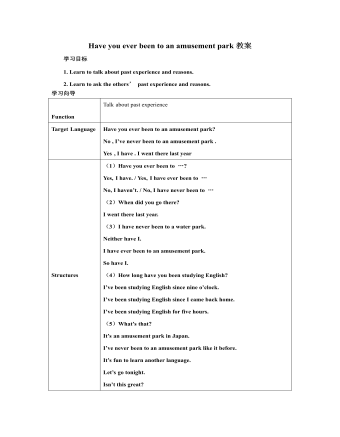
人教版新目标初中英语八年级下册Have you ever been to an amusement park教案
(1)Have you ever been to …? Yes, I have. / Yes, I have ever been to …No, I haven’t. / No, I have never been to …(2)When did you go there? I went there last year. (3)I have never been to a water park. Neither have I. I have ever been to an amusement park. So have I. (4)How long have you been studying English? I’ve been studying English since nine o’clock. I’ve been studying English since I came back home. I’ve been studying English for five hours. (5)What’s that? It’s an amusement park in Japan. I’ve never been to an amusement park like it before. It’s fun to learn another language. Let’s go tonight. Isn’t this great?space museum, amusement park, water park, South America, Peru, Holland, European culture, tour guide, flight attendant, musical instrument, more than, be from, get to, take lessons, neither, discover, graduate, change

人教版新目标初中英语八年级下册It’s a nice day, isn’t it教案2篇
"Hello! Welcome to English class! Introduce yourself. Meet your new classmates." That's what the teacher says. What do you say? "Oh no!" It can be difficult talking to new people. But it can be fun, and you can make friends. How do you do it? Make small talk. Small talk is polite conversation. "Wang Nan is a great pingpang player, isn't she?" "I'd love to meet her, wouldn't you?" "It's been raining a lot, hasn't it?" Tag questions are a form of polite speech. To make small talk successfully, you should know how to make them. You should also know what topics to talk about. Try to learn this unit carefully. The next time you're in English class, you'll find out. Making small talk's easy, isn't it? (“你好!欢迎你!请做一下自我介绍。认识一下你的新同学。”通常在课上老师会这样说。你会说什么呢?“噢,不!”与陌生人谈话太困难了。但是这也很有意思,并且你还能交到朋友。你该怎么做呢?闲聊。闲聊指得是礼貌的对话。“王楠是一个很棒的乒乓球运动员,不是吗?”“我希望自己能认识她,你呢?“今年的雨水很多,不是吗?”反意疑问句是一种礼貌用语。为了使得谈话成功,你应该知道怎样去进行闲聊。你还应该知道与不同的人该谈论什么样的话题。认真的学习这个单元吧,下次在英语课上,你会发现与大家展开谈话是一件很容易的事情,不信我们来试试。)

人教版新目标初中英语八年级下册He said I was hard-working教案2篇
This activity introduces some new vocabulary and provide oral practice using the target language.Task 1 . Ask four students to stand in front of the class, and the teacher asks them the following questions as a reporter.1.What are you going to do when you grow up?2.What are you going to do next week?3.What are going to do after school?The students will give different answers, then ask a good student to report what they said.I am going to e a doctor.What did she say?----------She said she was going to be a doctor.I am going to have a party on Friday night.What did he say?-------He said he was going to have a party on Friday night.I am going to do my homework.What did she say ?------ She said she was going to do her homework.I am going home after school.What did she say?-----She said she was going home after school.Say In this unit we are going to learn to use words like to report what someone said.Task 2. Read the instructions. Then ask a student to read the four questions. And write the words on the Bb. Explain what soap opera is.Task 3. Ask the students to Look at the pictures, point out the TV screens in the picture. Ask one girl to read what Marcia said.What did Marcia say? She said She said she was having a surprise party for Lana on Friday night. Repeat the other pictures in the same way.Activity3. Listen and number the pictures in activity 1a.

人教版新目标初中英语八年级下册What were you doing when the UFO arrived教案2篇
(一).知识方面: 1.培养学生能运用过去进行时来描述、谈论过去某个时间正在发生的事情或动作的意识和能力,能就过去某个时间正在发生的动作做出正确的描述。 2.培养学生的想象力和角色扮演的合作能力。 3.培养学生讲述过去发生的事情经过的能力。能正确运用一般过去时来讲述故事。 (二).技能方面: 1.本单元的语言目标是Talk about past events and tell a story(谈论过去的时间和讲述一个故事),围绕这一目标,要涉及句型: What were you doing when the UFO arrived? ----I was sitting in the barber’s chair. The barber was cutting my hair. 因此必须学习standing、studying、cleaning、sleeping、cooking、making、eating、cutting、等表示地点的词,以便为上述句型提供语言材料。2.学习过去进行时的有关知识。Was/were+现在分词,是该时态的表达式。 3.在学习过程中,要区分The boy was walking down the street when the UFO landed.和While the boy was walking down the street, the UFO landed.这两种由when和while引导的状语从句的句型结构。注意它们的不同。
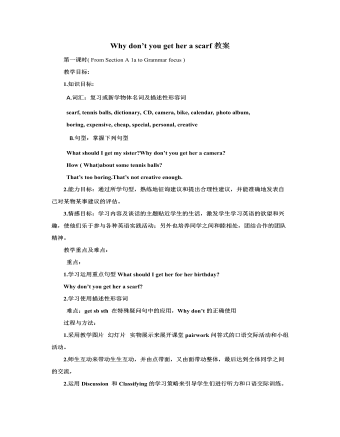
人教版新目标初中英语八年级下册Why don’t you get her a scarf教案
教师带领学生复习有关描述宠物的词汇,采用教师提问学生回答的方进行。如:T:What animals do you think would be good pets?What animals do you think would be bad pets?What do you think are good animals for a six-year-old child?然后学生进行 pairwork 练习。Task two: 师生互动,学习探究 1、播放3a部分的录音,引导学生一边听录音,一边跟读。2、通过听录音学生回答以下问题:Why do you think pot-bellied pigs are popular?What are the advantages and disadvantages of keeping such a pet?教师对学生的回答进行及时点评。3.学习范文,学习重点短语,为下步的模仿写作提供语言素材。T :1. )Have you ever kept a pig as a pet?Do you like pigs? St.:No.…Why don’t you like to keep a pig? St: No.They’re too dirty and lazy(Do you know in some foreign countries like Hollyland, Australia,pigs are the most popular pet.there’s a kind of pig.(图)it has an interesting name? it ‘s called a pot-bellied pig.) Now,let’s learn an article about this kind of interesting pet.2.)play the tapeSt.:Listen and repeat3.)show some Qs on computer(本子St.: read silently,then answerthe Qs(本子)4.)Ask ss. Close book and retell this passage.(what is a pot-bellied pig? Is it a good or bad pet? ) St.: retell it to each other“A pot –bellied pig is a popular pet now…”5.read the article together.St.:.practice reading

人教版新目标初中英语九年级下册By the time I got outside, the bus had already left教案
Ⅰ. Teaching Aims and Demands1. Knowledge Objects(1) Key Vocabularyoversleep(2) Target LanguageWhat happened?I overslept. And by the time I got up, my brother had already gotten in the shower.2. Ability Objects(1) Teach the students to use the new words.(2) Train the students to narrate past events with the Past Perfect Tense.(3) Train the students' listening and speaking skills with the target language.3. Moral ObjectIt’s a good habit to go to bed early in the evening and get up early in the morning. So you’ll never be in a hurry in the morning.Ⅱ. Teaching Key Points1. Key Vocabularyoversleep2. Target LanguageNarrate past events with the Past Perfect TenseⅢ. Teaching Difficult Points1. Train the students to narrate past events with the Past Perfect Tense.2. Train the students to understand the target language in spoken conversation.Ⅳ. Teaching Methods1. Thinking of examples from the students' real lives.2. Making sentences by looking at the pictures.Ⅴ. Teaching AidA tape recorderⅥ. Teaching ProceduresStep I Revision1. Revise the language points in Unit 8.Ask some questions like this: What volunteer work would you like to do?Help the students to answer, I’d like to…/I love to…/I hope to2. Practice the dialogue in Activity 3c on page 62 again. Get students to role play the similar dialogues with the following.

人教版新目标初中英语九年级下册Rainy days make me sad教案
1. 教材分析本单元以how do things affect you?为话题, 从颜色、天气、音乐、广告、产品等方面谈论了外界事物如何影响人的心情。要求学生掌握表达某物或某事给人带来的感觉、看法或影响等。共设计了四个部分的内容:Section A 该部分有4个模块:第一模块围绕Which restaurant would you like to go to?这一话题展开思维(1a)、听力(1b)、口语(1c)训练;第二模块围绕How does music affect you? 进行听力(2a-2b)、口语训练(2c);第三模块继续围绕how do colors in the restaurant affect you这一话题展开训练,训练形式为阅读和问题体验(3a)和小组活动(3b);第四模块仍就How do things affect you这一话题以调查的形式展开讨论。Section B该部分有4个模块:第一模块围绕产品广告对人们的影响这一话题以“配对”(1a)与“列举”(1b)两种形式展开训练;第二模块继续围绕How do things affect you? 进行听力(2a-2b)、口语对话训练(2c);第三模块围绕“Advertising”这一话题展开阅读(3a-3b)和写作(3c)训练;第四模块围绕How posters affect you这一话题以口语训练形式展开小组活动。

人教版新目标初中英语九年级下册Could you please tell me where the restrooms are教案
Step Ⅰ RevisionCheck homework. Ask a few students to read the article in 3a.Then ask a few students to read their guides.Step Ⅱ Part 1Look at the words in the box. Ask a student to read them. Make sure the students understand the meaning of the words. You are to fill in the blanks with the words. In some cases, students may need to use another form of the word, for example adjusting for tense or subject/ verb agreement.Ask students to fill in the blanks on their own.Check the answers. Step ⅢPart 2Go through the instructions with the class.Look at the example with the students.Ask students what the answer would be.Ask a student to read the question and answer it.Excuse me, could you tell me where the bank is, please?The bank is across the street from the shopping malt.Get students to complete the work in pairs.Check the answers. Ask a few students to read their questions.Step Ⅳ Just for Fun!Ask all the students to read the conversation. Ask: What is funny about this cartoon? Help students to explain. A Martian is a person from the planet Mars.There is no such thing as Martian food on Earth, and the clerk looks silly because he is trying to think of where there is a Martian restaurant.Invite some pairs of students to present this conversation to the rest of the class.Step Ⅴ Summary and HomeworkIn this class, we’ve done much writing practice using the key vocabulary words and the target language presented in this unit. After class, please finish the questions in 2 in your exercise books. Then finish the exercises on pages 47~48 of the workbook as well.The Seventh Period Ⅰ Teaching Aims and Demands1. Knowledge Objects(1) Key Vocabularyimage, adventure, jealousy, hero, crime, journey, brave, no longer, show interest in, take it easy, become interested in, plain looks(2)Text:Grown-ups like cartoons, too.2. Ability Objects(1) Fast-reading to get a general idea of the text.(2) Careful-reading to get the detailed information in the text.

人教版新目标初中英语九年级下册I’ll help clean up the city parks教案
Talk about offering help (P60)I’ll help clean up the city parks.A: I’d like to work ...B: You could help ...Talk about ways to tell people about the Clean-Up Day (P61)We need to ...We can’t ...I’ll ...Talk about the work the volunteers do (P62)These three students all volunteer their time to help other people.Somebody loves to ... / helps ... / plans to ... / wants to ...A: What do you like doing?B: I like ... A: What kind of volunteer work do you think I could do?B: You could ...1. 重点词汇advertisement, fix, repair, pleasure, blind, deaf, shut, carry, specially, fetch2. 认读词汇hunger, homeless, cheer, clean-up, sign, establish, major, commitment, elementary, veterinarian, coach, similar, call-in, strategy, disabled, organization, unable, support, appreciate, donation, part of speech, pronoun, adverb, preposition, conjunction, donate, Jimmy, Sally3. 词组clean up, cheer up, give out, put off, set up, think up, take after, fix up, give away, put up, hand out, work out, at once

人教版新目标初中英语九年级下册We’re trying to save the manatees教案2篇
本单元主要围绕着有关濒临灭绝的动物这一话题,学习了应该怎样保护我们的环境,以及就某一问题展开辩论。目标提示语言目标能够运用所学知识,就某一问题展开辩论。认知目标1、复习一些语法:现在进行时、一般现在时、用used to 表示一般过去时、现在完成时、一般过去时的被动语态。2、学会表达同意和不同意。3、学会以下基本句型:We’re trying to save the manatees.Manatees eat about 100 pounds of food a day.There used to be a lot of manatees.In 1972,it was discovered that they were endangered.Some of the swamps have become polluted.情感目标了解一些濒临灭绝的动物的生活习性和濒临灭绝的原因,教育学生应该如何保护环境。教学提示充分利用多媒体等教学设备,创设与本课话题相关的情境,如各种不同种类的动物、动物园以及有关环境的画画等等。围绕着本单元的教学目标,设计一些贴近学生实际的教学任务,如让学生谈论自己最喜欢的动物,如何拯救濒危动物,如何保护环境等等。让学生根据所学知识,就动物园是否对动物有利以及其他的话题进行辩论。
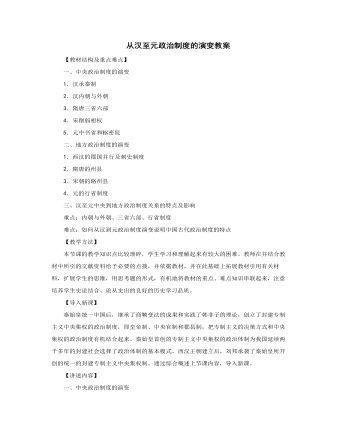
人教版高中历史必修1从汉至元政治制度的演变教案
【教学方法】本节课的教学知识点比较琐碎,学生学习和理解起来有较大的困难。教师在并结合教材中所引的文献资料给予必要的点拨,并依据教材,并在此基础上拓展教材引用有关材料,扩展学生的思维,用思考题的形式,有机地将教材的重点、难点知识串联起来,注意培养学生史论结合、论从史出的良好的历史学习品质。【导入新课】秦始皇统一中国后,继承了商鞅变法的成果和实践了韩非子的理论,创立了封建专制主义中央集权的政治制度,即皇帝制、中央官制和郡县制,把专制主义的决策方式和中央集权的政治制度有机结合起来。秦始皇首创的专制主义中央集权的政治体制为我国延续两千多年的封建社会选择了政治体制的基本模式。西汉王朝建立后,刘邦承袭了秦始皇所开创的统一的封建专制主义中央集权制。通过综合概述上节课内容,导入新课。
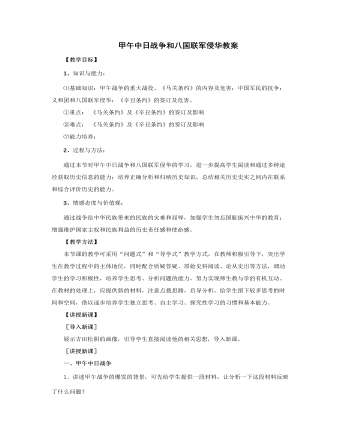
人教版高中历史必修1甲午中日战争和八国联军侵华教案
(1)巨额的赔款,是列强对中国空前的大规模勒索;为支付这笔巨额赔款,清政府加紧搜刮人民,使人民生活更加贫困,社会经济更加凋敝。(2)在北京设立的“使馆界”,实际上是“国中之国”,是帝国主义策划侵略中国的大本营。外国侵略者控制京津地区,使清政府完全处于外国军队的控制之下,便于侵略者直接派兵镇压中国人民的反帝斗争。(3)按照条约规定,清朝官吏严厉镇压中国人民的反帝斗争,进一步成为帝国主义的帮凶。(4)改设外务部的规定,便于清政府能够按照外国侵略者的意旨实行卖国的外交政策。《辛丑条约》是帝国主义强加给中国的一个严重的不平等条约,列强除了穷凶极恶地对中国敲诈勒索外,还重新确立了以慈禧太后为首的清政府继续充当它们在华的代理人。

人教版高中历史必修1古代希腊民主政治教案
二.运用思考题目,激发学生对本课问题的探究,检查学生在学习过程中,结合所学的知识,对问题的思考、质疑;从而学会查阅、搜集资料,分析、整理;通过讨论、交流,得出新的认识。学生可根据自己的实际情况和个人爱好,可选择不同的作业呈现方式,包括作业的问题的选择、缴交的方式(制作、小论文、课件)等等,从而体现学生对古代希腊雅典民主政治产生的条件、雅典民主政治的内容及其意义的认识的程度。1.“东西方不同政治制度选择的因素分析”(课前)2.古代雅典民主政治制度对人类文明的影响。(课后)七.反思与总结本课的设计在实施过程中,总体效果比较好,对课标的要求基本达至。尤其是通过东西方不同政治制度选择的对比,不但复习了旧的知识,而且加深了对新知识的掌握,从而有更深入的认识。学生在这个问题的学习过程中,通过课前自身的活动(搜集、查阅资料),逐步培养历史的学习的方法;在课堂上,同学们通过讨论的过程,互相交流、分享心得体会;逐步提高自己的思维能力。
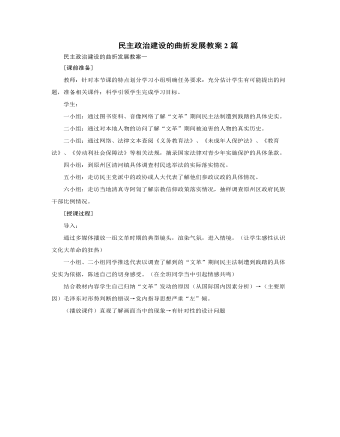
人教版高中历史必修1民主政治建设的曲折发展教案2篇
3.法律制度走向健全关于法律制度走向健全的历史条件,可指导学生阅读教材相关段落,教师适当补充说明,得出结论:提出法制建设方针并着手平反冤假错案,这是恢复和加强民主法制建设的重要举措。为全面开展法制建设准备了政治基础。关于法制建设方针的提出,可由教师补充材料,使学生理解加强法制建设的必要性,如:邓小平会见意大利记者奥琳埃娜?法拉奇(1980年8月)“奥:我看不出怎样才能避免或防止再发生诸如“文化大革命”这样可怕的事情。”“邓:这要从制度方面解决问题。我们过去的一些制度,实际上受了封建主义的影响,包括个人迷信、家长制或家长作风,甚至包括干部职务终身制。我们现在正在研究避免重复这种现象,准备从改革制度着手。我们这个国家有几千年封建社会的历史,缺乏社会主义的民主和社会主义的法制。现在我们要认真建立社会主义的民主制度和社会主义法制。只有这样,才能解决问题。”

人教版高中历史必修1两极世界的形成教案2篇
这三大措施是美国在冷战初期的核心内容,是为了实现美国的霸权政策而提出。它们体现了美国充分利用了意识形态差异的来其实现其全球霸权的意图。把握住这些核心内容将有助于掌握二战后的国际形势的发展。教学难点:两极格局对二战后国际关系发展的影响二战改变国际的主要政治力量,随着国家利益和意识形态冲突,美苏两大国由合作走向分裂,逐步形成了战后的两极格局。在此政治格局之下,避免了新的世界大战爆发,世界相对稳定,但两强相争,又使得世界长期不得安宁。美苏之间的关系影响到了其他各种关系的发展,认清此格局的影响对于认识当时和今天的国际关系具有重大的意义。三、教学内容安排(1学时)第一目“从盟友到对手”教学要点:雅尔塔体系的确立;战后初期的形势;杜鲁门主义的提出。第二目“美苏‘冷战’”教学要点:马歇尔计划与经济互助委员会;北约与华约两大军事政治集团的对峙。第三目“‘冷战’阴影下的国际关系”

人教版高中历史必修1明清君主专制的加强教案
对于教材最后一段内容,设计如下一个课堂研讨题。让学生课前查找有关资料,在主动获取知识的过程中,对比17、18世纪中国和欧洲的历史,了解为什么会出现不同的发展趋势?【课堂研讨】17、18世纪中国和欧洲的封建国家都进行了加强君主专制的改革措施。如东方有康熙大帝,西方有路易“太阳王”,他们都使中、法两国进入到封建的鼎盛时代。但改革却在中国和欧洲产生了不同影响。这是为什么?通过网络或有关论著,查找有关资料让学生发表自己的观点和看法。启示:17、18世纪的中国在政治上空前强化君主专制,在经济上重农抑商,在外交上闭关锁国,影响了中国资本主义萌芽的正常发展;文化上文字狱,禁锢了文化。17、18世纪的欧洲在政治上加强君主专制来反对罗马教廷的控制,却实行君主开明专制;在经济上实行重商主义;在外交上鼓励对外扩张,促进了资本主义在欧洲的发展;文化上,启蒙思想蓬勃发展。

人教版高中历史必修1世界多极化趋势的出现教案2篇
一、 教学目标 (一)知识与能力通过了解多极化趋势和对世界的影响、欧盟的形成和扩展、日本成为经济大国的过程和原因、中国和第三世界的崛起等基本史实,培养学生综合探究和归纳知识的能力(二)过程与方法以合作学习的“创设情境—目标显示—自学尝试—合作学习—成果汇报—总结评价”模式为主线,以学生自主探究活动为主体,以教师点拨为主导,以培养学生学习的兴趣和能力为中心,来优化课堂教学。教师创设重大国际事件的情境,让学生亲自探索各个主要国家对朝鲜战争和伊拉克战争立场和态度的决策,培养学生解读历史信息能力,并能够根据自身的实际情况和外部环境,正确应对重大事件。 (三)情感态度与价值观提高学生对二战后美苏两极以外的各种政治经济力量增长的认识,初步理解世界多极化趋势的形成及影响,树立世界走向多极化是不可阻挡的历史潮流的价值判断标准。

